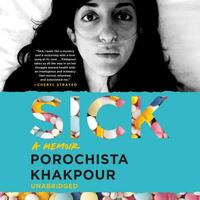You need to sign in or sign up before continuing.
Take a photo of a barcode or cover
slow-paced
I don’t know how to feel about this. Maybe that’s the reason to read it. I swung between a hyper aware intimacy with the way Khakpour describes illness and a vague disgruntled apathy at the way I felt she was making the wrong choices. Which, I suppose, is an important thing to catch. Khakpour owes us no zen story of healing, of course, and I think she writes an important messy story that’s more common than people realize.
Moderate: Addiction, Alcoholism, Chronic illness, Drug abuse, Drug use, Panic attacks/disorders, Medical content, Medical trauma, Car accident, Alcohol, Colonisation
Minor: Miscarriage, Self harm
Have to look up MS, taking care of one's health as a full time job. How do you end a memoir? You're still living... Very curious how others at the same moment would describe the same situations.
all the people who had petty, bad reviews are crazy. this is a well-written and really interesting memoir about being chronically ill and navigating the unknowns of that illness. furthermore, it's hard to write about chronic illness, especially when you're actually suffering from it, so to do all that while being sick is impressive. i thought it was stylistically written well and different segments that didn't seem to be related were strung together nicely in the end. you don't need to like someone personally to enjoy their memoir--that seemed to be the issue for most people.
the most interesting parts were tidbits of statistics on women with chronic illness and how PTSD affects this (surprise surprise, i feel like this is a huge breakthrough that has more and more potency as time goes on) and in general, how auto immune diseases tend to affect women more because of PTSD and their every day stressors.
the most interesting parts were tidbits of statistics on women with chronic illness and how PTSD affects this (surprise surprise, i feel like this is a huge breakthrough that has more and more potency as time goes on) and in general, how auto immune diseases tend to affect women more because of PTSD and their every day stressors.
really closer to 3.5 stars. It was hard for me to read the endless litany of confusing symptoms without flashing through my own journey with Lyme. I wish the best for the author and hope folks in her life keep showing up when Lyme kicks her down. I know my community of support was essential for me.
hopeful
informative
inspiring
reflective
slow-paced
Sickness, particularly of the chronic, wearing variety, tends to drive community away. But it also creates it anew. Porochista Khakpour's Sick is a testament to that reality and, most importantly, a testament to the untidy nature of illness. Far too many illness memoirs offer a tidy arc, the kind of story that appeals to the well, who desire illnesses with a beginning, middle, and end like any good story. Sick doesn't offer that. Instead, it demands the reader accept that none of those things are true of chronic illness, that there are many beginnings and middles and no one knows the end until they're dead and it's too late to write the story. As Khakpour notes in the final pages, this book tries to rewrite itself, offering new and more iterations on illness even beyond its deadlines and edits. That is what it means to live with a condition that doesn't go away, sweeping the floor clean in its way out. There is no ending, just a new arrangement of the pieces and another day to try again and I am grateful to this act of narrative and political resistance.
This was not what I thought it would be.
I dont want to say anything negative about someone's Memoir because after all this is her story that she is telling.
It simply was not what I thought it would be.
I dont want to say anything negative about someone's Memoir because after all this is her story that she is telling.
It simply was not what I thought it would be.
Porochista Khakpour has written a memoir about sickness that through its design and prose mirrors sickness. This makes it hard to read, for different reasons. The story moves back and forth in ways that are sometimes hard to follow, it stops and starts up again later on or is altogether forgotten, sometimes things just don't make sense. It's messy. Being sick, especially with an illness that is untreated, denied, psychosomaticized, is messy. Some readers wish she had "cleaned it up" so that it was more palatable, so they didn't have to feel the discomfort, frustration, annoyance, and confusion the text invokes as it is. Other readers, and it seems in particular those of us who share her experience (or some of it) feel that FINALLY we are reading a memoir that represents us in our messiness, without apology or shame.
This book is full of insights for those of you who do not share this experience, if you are willing to work for it. And you should. Our experiences matter, and they are underrepresented, misunderstood, stigmatized, ridiculed, and ignored. Books like this are necessary and vital to our survival.
This book is full of insights for those of you who do not share this experience, if you are willing to work for it. And you should. Our experiences matter, and they are underrepresented, misunderstood, stigmatized, ridiculed, and ignored. Books like this are necessary and vital to our survival.





